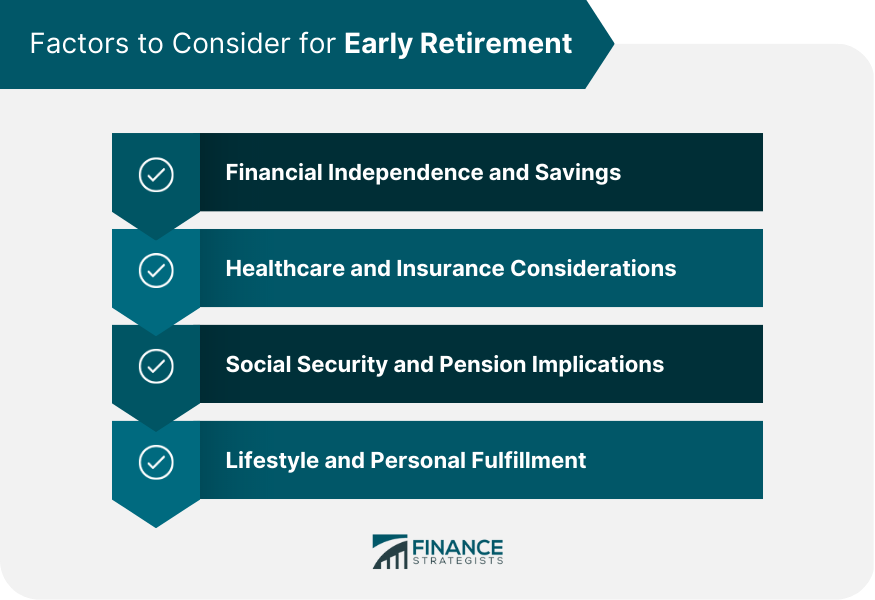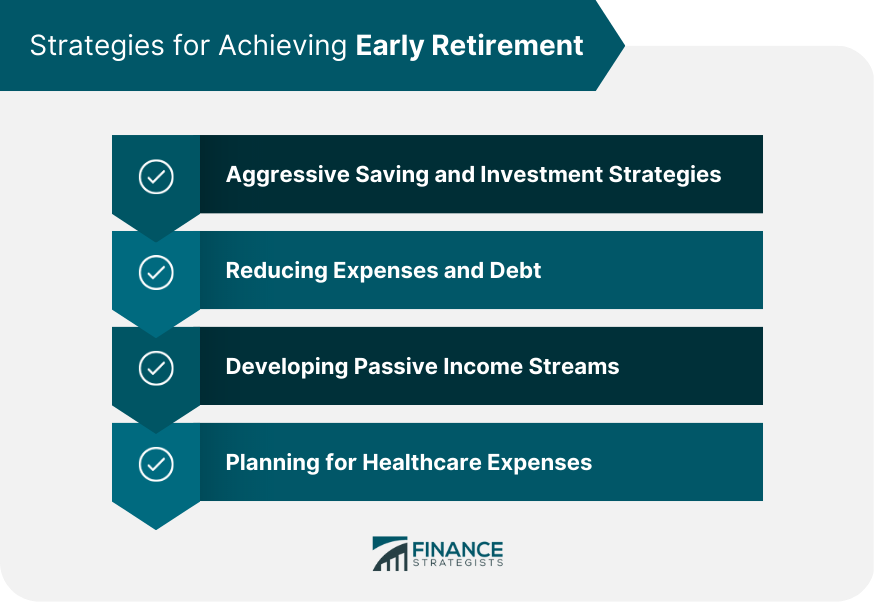Early retirement refers to leaving the workforce before the traditional retirement age, typically around 65. Many people aspire to retire early, seeking the freedom and flexibility to pursue their passions, hobbies, and personal interests. The benefits of early retirement can include increased leisure time, the opportunity to travel, and the freedom to pursue personal goals. On the other hand, early retirees must also address the challenges of financial independence, healthcare coverage, and maintaining a fulfilling lifestyle. To achieve early retirement, individuals must accumulate enough savings and investments to support their desired lifestyle for an extended period. This requires careful planning, budgeting, and investment strategies. Early retirees need to secure healthcare coverage, as they may not yet be eligible for Medicare. They should explore options such as private insurance, COBRA, or the Affordable Care Act (ACA) marketplace. Claiming Social Security benefits early can lead to permanently reduced benefits. Additionally, early retirees need to understand the implications of early pension distributions and coordinate these benefits with other retirement income sources. Early retirement offers the opportunity for personal growth and fulfillment, but it also requires planning for social connections, hobbies, and meaningful pursuits. Individuals pursuing early retirement should adopt aggressive saving and investment strategies, such as maximizing contributions to tax-advantaged retirement accounts and building a diversified investment portfolio. Minimizing living expenses and paying off high-interest debt can help early retirees reach their financial goals more quickly. Creating passive income sources, such as rental properties or dividend-paying stocks, can provide financial stability in early retirement. Early retirees should factor in healthcare costs and explore various insurance options to ensure they have adequate coverage during retirement. Retirement accounts like 401(k)s and IRAs may be subject to early withdrawal penalties if distributions are taken before age 59½. However, there are exceptions, such as the Rule of 55 or substantially equal periodic payments (SEPP), that may allow penalty-free withdrawals. Early retirees should be aware of required minimum distributions (RMDs) from their retirement accounts, which begin at age 73. Tax planning is crucial for early retirees to minimize their tax liabilities and maximize the longevity of their retirement savings. Claiming Social Security benefits before full retirement age can result in permanently reduced benefits, impacting an early retiree's financial stability. Waiting to claim Social Security benefits until full retirement age or later can result in higher monthly payments, potentially offsetting the reduction from claiming early. Early retirees should explore strategies for maximizing their Social Security benefits, such as delaying benefits, coordinating spousal benefits, or considering survivor benefits. Some pension plans offer early distribution options for retirees, but these distributions may come with reduced benefits. Understanding the impact of early pension distributions on overall benefits is essential for early retirees to make informed decisions about their retirement income sources. Early retirees should coordinate their pension benefits with other retirement income sources, such as Social Security, investments, and passive income, to ensure a stable and consistent income stream throughout retirement. Early retirement provides an opportunity for individuals to dedicate more time to their hobbies and personal interests, enhancing their overall well-being and satisfaction with life. Many early retirees choose to engage in volunteer work or philanthropy, offering their skills and experience to support causes they are passionate about. Maintaining social connections and building support networks are crucial for early retirees to avoid isolation and foster a sense of belonging and purpose in their new phase of life. Inflation and cost of living increases can impact the purchasing power of an early retiree's savings, making it essential to account for these factors in their financial planning. Early retirees need to be prepared for market volatility and investment risks, adopting a diversified investment strategy to protect their retirement savings. Planning for healthcare costs, including potential long-term care expenses, is essential for early retirees to ensure they can afford the care they need as they age. Financial planners and advisors can provide valuable guidance on achieving early retirement goals, managing investments, and navigating the complexities of retirement income sources. Consulting with tax professionals can help early retirees understand the tax implications of their retirement decisions and develop strategies to minimize tax liabilities. Early retirees should consult with healthcare and insurance professionals to explore their options for healthcare coverage and plan for potential healthcare expenses during retirement. Early retirement is an appealing goal for many, offering the freedom to pursue personal interests and passions outside of the traditional workforce. To successfully transition to early retirement, individuals must carefully plan, save, and make strategic decisions to ensure their financial stability, healthcare coverage, and overall well-being. By addressing critical factors such as financial independence, Social Security and pension benefits, healthcare considerations, and lifestyle planning, aspiring early retirees can confidently navigate the challenges associated with this exciting new stage of life. Seeking professional guidance from financial advisors, tax professionals, and healthcare experts is crucial to achieving early retirement goals and ensuring long-term financial security. By working with these professionals, individuals can develop a comprehensive plan that accounts for market volatility, inflation, and tax implications, while also coordinating their retirement income sources and planning for potential healthcare expenses. With a solid plan in place and ongoing support from professionals, early retirees can embrace the opportunities and freedom that come with leaving the workforce ahead of schedule.What Is Early Retirement?
Factors to Consider for Early Retirement
Financial Independence and Savings
Healthcare and Insurance Considerations
Social Security and Pension Implications
Lifestyle and Personal Fulfillment

Strategies for Achieving Early Retirement
Aggressive Saving and Investment Strategies
Reducing Expenses and Debt
Developing Passive Income Streams
Planning for Healthcare Expenses

Impact of Early Retirement on Retirement Accounts
Early Withdrawal Penalties and Exceptions
Required Minimum Distributions (RMDs)
Tax Implications and Planning
Social Security Considerations
Claiming Social Security Benefits Early
Impact on Benefit Amounts
Strategies for Maximizing Social Security Benefits
Pension Plan Considerations
Early Pension Distribution Options
Impact on Pension Benefits
Coordinating Pension Benefits With Other Retirement Income Sources
Lifestyle and Personal Fulfillment in Early Retirement
Pursuing Hobbies and Personal Interests
Volunteering and Philanthropy
Social Connections and Support Networks
Navigating Potential Challenges in Early Retirement
Inflation and Cost of Living Increases
Market Volatility and Investment Risks
Healthcare Costs and Long-Term Care Planning
Seeking Professional Guidance
Working With Financial Planners and Advisors
Tax Planning and Consulting
Healthcare and Insurance Professionals
Conclusion
Early Retirement FAQs
Early retirement refers to the decision to retire from work before reaching the traditional retirement age, which is typically considered to be 65 years old.
The benefits of early retirement include having more time for leisure activities, travel, pursuing personal interests, and spending time with family and friends. It can also provide an opportunity to escape from work-related stress and enjoy a more flexible lifestyle.
Challenges of early retirement may include a reduced income or potential impact on retirement savings, health insurance coverage and costs, and potential long-term financial planning implications. It may also require careful budgeting and planning to ensure that the retirement savings last throughout the individual's lifetime.
Financially preparing for early retirement may involve saving and investing aggressively to build a sufficient retirement nest egg, minimizing debt, creating a comprehensive retirement plan, and considering potential income streams, such as part-time work or passive income sources.
Some factors to consider before making the decision for early retirement include the individual's financial readiness, health status, lifestyle expectations, potential impact on Social Security and Medicare benefits, and long-term financial goals. It's important to carefully evaluate all aspects and seek professional advice to make an informed decision about early retirement.
True Tamplin is a published author, public speaker, CEO of UpDigital, and founder of Finance Strategists.
True is a Certified Educator in Personal Finance (CEPF®), author of The Handy Financial Ratios Guide, a member of the Society for Advancing Business Editing and Writing, contributes to his financial education site, Finance Strategists, and has spoken to various financial communities such as the CFA Institute, as well as university students like his Alma mater, Biola University, where he received a bachelor of science in business and data analytics.
To learn more about True, visit his personal website or view his author profiles on Amazon, Nasdaq and Forbes.















